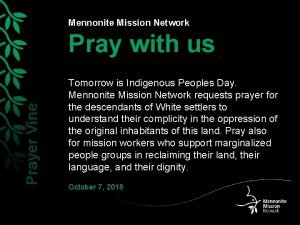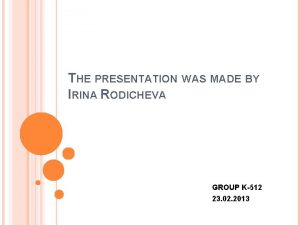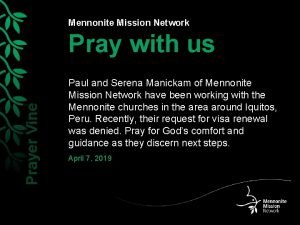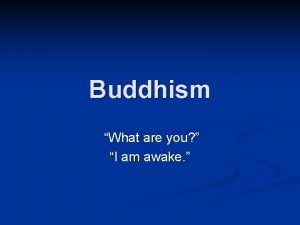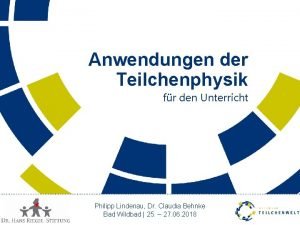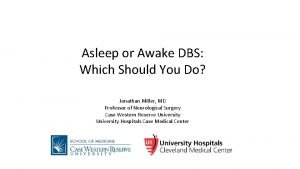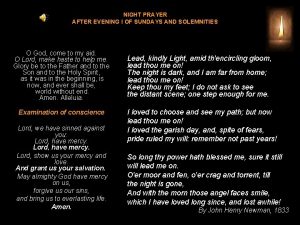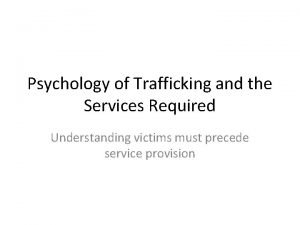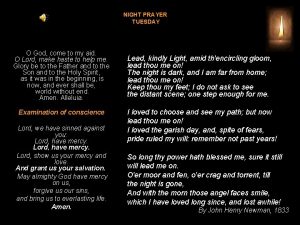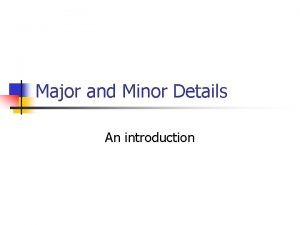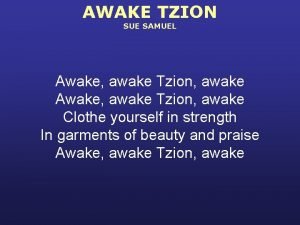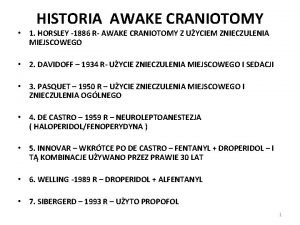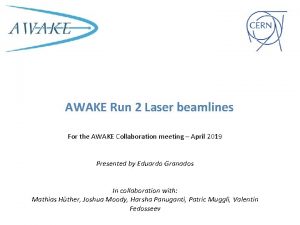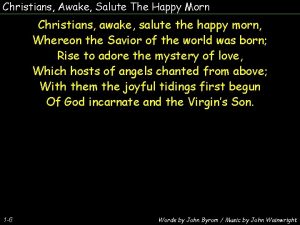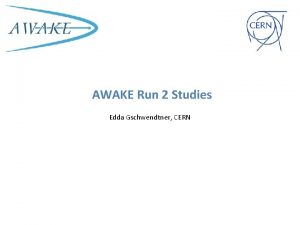Wide Awake Mennonite Support of Naziism in the
















![A Special Significance: “[Mennonites] have achieved superb economic accomplishments, modeled an exemplary community life, A Special Significance: “[Mennonites] have achieved superb economic accomplishments, modeled an exemplary community life,](https://slidetodoc.com/presentation_image_h2/6dd4f0594535b70d22d1ed8d79334d72/image-17.jpg)








- Slides: 25

Wide Awake Mennonite Support of Naziism in the Third Reich

“Wide awake, we … stand on the ground of the national socialist world view, stand on the ground of racial realism, and want to develop more and more into a true community of national socialist combatants” • -Hans Schroeder, Russian-German Mennonite “[the church] is grateful for the great uplift which God has given our people through your strength of will and also pledges its enthusiastic willingness to cooperate with building of our Fatherland with the strength of the Gospel, true to the motto of our Fathers. ” • -Mennonite Church leaders, in a telegraph to Adolf Hitler

Mennonite Support of the Nazis • Anti-Semitic • Praised eugenics/euthanasia • Supported Nazi suppression of other denominations, such as the Jehovah’s Witnesses • Controversy over swearing oaths

The Rhönbruderhof • Only Pacifist group in Nazi Germany • Anabaptist/Hutterite led by Ebhard Arnold • Dissolved by Nazis in April 1937 • Although American Mennonites defended the Bruderhof, German Mennonites did not “Children’s House at the Rhön Bruderhof. ” Global Anabaptist Mennonite Encyclopedia Online. https: //gameo. org/index. php? title=File: Rhon. jpg&filetimestamp=20170804 110057&.

Controversy over swearing oaths • For centuries, Mennonites had refused to swear oaths • However, to join the Nazi Party, they had to pledge loyalty to Hitler. • The were granted an exemption in some parts of Germany so that they could “participate in Nazi endeavors without ruffling their consciences. ” (Gerhard Wiens)

Prominent Mennonite SS Officials • John Kroeker • Son of a respected Mennonite scholar • Part of Einsatzgruppen • Heinrich Wiens • Oversaw extermination of a thousand Jews in Pjatigorsk, Russia • SS-Unterscharfuher Kurt Janzen • Block furher and leader of a labor detachment at Stutthof concentration camp near Danzig

Stutthof Concentration Camp • In Danzig • Over 60, 000 people murdered • Mennonite farmers hired out prisoners for the camp and Mennonite businessmen did business with the camp • One Mennonite used prisoners to build his factory • Many church members served as guards at the camp • Hopehill Reimannsfeld “View of the Stutthof concentration camp after the liberation. ” United States Holocaust Memorial Museum, courtesy of Panstwowe Muzeum Stutthof. https: //collections. ushmm. org/search/catalog/p a 1047045.

Choritza • Settled by German Mennonite refugees in 1700 s • 35, 000 Mennonites lived in Ukraine • Viewed Germans as “liberators” • Lauded the “completion of extermination of Jews from the region of Zaporozhia” • As many as two dozen joined the death squads • 44, 000 Jews massacred from 1942 -1943 “Mennonite Settlements in European Russia. ” Mennonite Encyclopedia. https: //gameo. org/index. php? title=File: ME 4_382. jpg&filetimestamp=2013082 3171302&

Distinctive Doctrines 1. Believer’s Baptism 2. Refusal to Hold Public Office 3. Refusal to Swear Oaths 4. Biblical Nonresistance (or pacifism) “There shall unquestionably fall from us the devilish weapons of force. ” -Michael Sattler, “Schleithem Confession of Faith, ” 1527 “Schleitham Confession title. Mennonite Church USA. https: //gameo. org/index. php? title=File: AMC_X-311_18_3. jpg&filetimestamp=20130823171229&

Theology of Suffering and Mythology of Martyrdom • • Martyr’s Mirror In the German States, Mennonites were second class citizens when not outlawed. Refused military service, and were therefore taxed Many fled persecution to Canada, the United States, and Russia Jan Luiken. “Burning of 18 Persons, Salzburg, 1528. ” Mennonite Library and Archives. https: //mla. bethelks. edu/holdings/scans/martyrsmirror/

Although is it unfair to say the German Mennonites were worse than the German Protestants and German Catholics at the time, actions should be considered differently in light of their distinct doctrines. Certain, unique reasons for their allegiance to the Nazi regime must be examined.

Reason One: The Persecution of German-Russian Mennonites by the Communists

• German Mennonites immigrated to Russia to escape Prussian militarism • After the Communist Revolution, Mennonites faced hardship, particularly in the 1920 s and 1930 s • Many fled to Germany, “ then to North and South America Mennonites Leaving Russia for Canada, an Emigrant Train at the Lichtenau Station. ” Mennonite Library and Archives. https: //mla. bethelks. edu/archives/numberedphotos/pholist 2. php? num=2003 -0278

“There is a terror in Russia now which is terrible. Medieval tortures are practiced in some cases, and whole Mennonite villages are being driven out into the steppes with nothing and no hope…A general collapse is inevitable I believe, although in the process millions may perish. ” -Harold Bender

Soviet Persecution • The Soviets targeted Mennonites because they were relatively prosperous and ethnically distinct • Persecution of Mennonites in Ukraine laid the seeds of “a kind of moral and lawless indifference to the inner voice of conscience and restraint. ”

Reason Two: The Favored Racial Status the Mennonites Occupied under the Nazi Regime
![A Special Significance Mennonites have achieved superb economic accomplishments modeled an exemplary community life A Special Significance: “[Mennonites] have achieved superb economic accomplishments, modeled an exemplary community life,](https://slidetodoc.com/presentation_image_h2/6dd4f0594535b70d22d1ed8d79334d72/image-17.jpg)
A Special Significance: “[Mennonites] have achieved superb economic accomplishments, modeled an exemplary community life, and established highly developed forms of education and pedagogy. They have produced a great number of extremely important intellectuals. Beyond this, they have a special significance for the overseas promotion of racial identity. ” -Karl Gotz, The Culture of the Black Sea Germans: the Mennonites

Racial Purity • Nazi scientists compared Mennonites fleeing Soviet persecution with the Mennonites still living in Germany • “Heredity quotient” of 95% • Mennonites designated “O-cases, ” or ost

Nazi Support of Mennonites • Nazis twisted the historical doctrine of nonresistance into a refusal of violence in religious matters • Heinrich Himmler called them the best of all the people he had visited in Ukraine “Heinrich Himmler Entering an Evening Meeting. ” Mennonite Archival Information Database. https: //archives. mhsc. ca/index. php/heinrichhimmler-entering-evening-meeting

Reason Three: Unraveling of Doctrine and Assimilation due to Cultural Pressure

A Worldview Shift • Wars, nationalism, and kulterkampf during the end of 1800 s • Those committed to nonresistance and separation from the government left • Those behind began to develop a “specifically Anabaptist version of German nationalism. ” • Claimed to embody “True Germanness”

Unraveling of Nonresistance • In 1870, the Danzig Church turned nonresistance into a matter of conscience • In World War I, 2, 000 Mennonites served in German military • In 1934, the German Mennonite conference dropped the nonresistant position from the written confession of faith

Thank you

Primary Sources Bender, Harold. Letter from Harold Bender to Elizabeth Bender, February 1, 1930. Harold Stauffer Bender Papers. Mennonite Historical Library. Goshen, IN. ---------- Letter from Harold Bender to William Bender, November 4, 1935. Harold Stauffer Bender Papers. Mennonite Historical Library. Goshen, IN. ---------- Letter from Mennonite Central Commitee to Hans Luther (German Ambassador), November 30, 1936, Harold Stauffer Bender Papers. Mennonite Historical Library. Goshen, IN. “Bericht Uber die 4. Allgemeine Westpreussen Konference in Tieganhagen am 10. September 1933. ” In Mennonitische Blatter, October (1933): 101. Bracht, Thielem J. von. The Bloody Theatre, or Martyrs' Mirror, of the Defenceless Christians: who suffered and were put to death for the testimony of Jesus, their Savior, from the time of Christ until the year A. D. 1660. Lampeter Square, Lancaster Co. , PA: David Miller, 1837. “Dordrecht Confession of Faith. ” Ana-baptist Confessions of Faith. The Reformed Reader. http: //www. reformedreader. org/ccc/abc. htm. Frisennot (Frisians in Distress). Directed by Peter Hagen. Delta Film, 1935. 1 hr. 30 min. Götz, Karl. The Culture of the Black Sea Germans: the Mennonites. Translated by John Roth. NSDAP Wartheland Regional Office: Wartheland, Poland, 1944. Krahn, Cornelius. Letter from Cornelius Krahn to Harold Bender, May 21, 1940. Harold Stauffer Bender Papers. Mennonite Historical Library. Goshen, IN. Kroeker, John J. John Kroeker to Harold Bender, May 1, 1939, Harold Bender Papers. Mennonite Historical Library. Goshen, IN. “The Schleithem Confession of Faith, 1527. ” Translated by John Yoder. Global Anabaptist Mennonite Encyclopedia Online. https: //anabaptistwiki. org/mediawiki/index. php? title=Schleitheim_Confession_(source). “The Stuttgart Declaration of Guilt by the Council of the Protestant Church of Germany October 19, 1945. ” Translated by Harold Marcuse. UC Santa Barbara Department of History. http: //marcuse. faculty. history. ucsb. edu/projects/niem/Stuttgart. Declaration. htm.

Secondary Sources Goossen, Benjamin. “Becoming Aryan. ” Canadian Mennonite 20, no. 12 (July 4, 2016): 12. ------------. Chosen Nation: Mennonites and Germany in a Global Era. Princeton, NJ: Princeton University Press, 2017. -------------. “Measuring Mennonitism: Racial Categorization in Nazi Germany and Beyond. ” Journal of Mennonite Studies 34, (2016): 225 -246. Koop, Karl. “A Complication for the Mennonite Peace Tradition: Wilhelm Mannhardt’s Defense of Military Service. ” Conrad Grebel Review 34, no. 1 (2016): 28 -48. Lichti, James. Houses on the Sand? Pacifist Denominations in Nazi Germany. New York: Peter Lang Publishing, 2008. Rempel, Gerhard. “Heinrich Hajo Schroeder: The Allure of Race and Space in Hitler’s Empire. ” Journal of Mennonite Studies 29 (2011): 227– 54. -----------. “Mennonites and the Holocaust: From Collaboration to Perpetuation. ” The Mennonite Quarterly Review 84, no. 4 (January 1, 2010): 507 -553. “Rhön Bruderhof (Hessen Germany). ” Global Anabaptist Mennonite Encyclopedia Online. https: //gameo. org/index. php? title=Rh%C 3%B 6 n_Bruderhof_(Hessen, _Germany). Schroeder, Steven Mark. “Prussian Mennonites in the Third Reich and Beyond: The Uneasy Synthesis of National and Religious Myth. ” Masters Thesis, University of British Columbia, 2001. Theisen, John. Mennonite and Nazi? Attitudes Among Mennonite Colonists in Latin America 1933 -1945. Kitchener, ON: Pandora, 1999.
 I lean into your love
I lean into your love The great spirit prayer
The great spirit prayer Zelenyj borshch
Zelenyj borshch Mennonite prayers
Mennonite prayers Wide shot
Wide shot Who is unhappy over the whole earth
Who is unhappy over the whole earth Only that day dawns to which we are awake
Only that day dawns to which we are awake Awake the united states
Awake the united states Christ is risen from the grave come awake
Christ is risen from the grave come awake I am awake buddha
I am awake buddha Throw in simple past
Throw in simple past Food to stay awake
Food to stay awake Philipp maier awake
Philipp maier awake Awake
Awake We are awake
We are awake Awake dbs
Awake dbs Save us lord while we are awake
Save us lord while we are awake Trauma bonding quotes
Trauma bonding quotes Save us lord while we are awake
Save us lord while we are awake Major and minor supporting details examples
Major and minor supporting details examples Các môn thể thao bắt đầu bằng tiếng nhảy
Các môn thể thao bắt đầu bằng tiếng nhảy Công thức tính độ biến thiên đông lượng
Công thức tính độ biến thiên đông lượng Hát kết hợp bộ gõ cơ thể
Hát kết hợp bộ gõ cơ thể Khi nào hổ con có thể sống độc lập
Khi nào hổ con có thể sống độc lập Thế nào là mạng điện lắp đặt kiểu nổi
Thế nào là mạng điện lắp đặt kiểu nổi Dạng đột biến một nhiễm là
Dạng đột biến một nhiễm là

